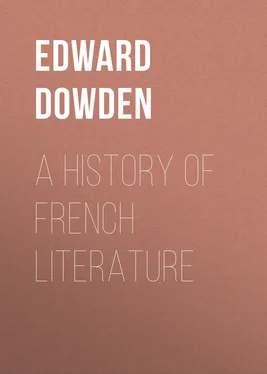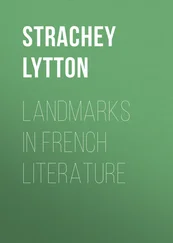Edward Dowden - A History of French Literature
Здесь есть возможность читать онлайн «Edward Dowden - A History of French Literature» — ознакомительный отрывок электронной книги совершенно бесплатно, а после прочтения отрывка купить полную версию. В некоторых случаях можно слушать аудио, скачать через торрент в формате fb2 и присутствует краткое содержание. Жанр: foreign_prose, foreign_home, Критика, Языкознание, foreign_antique, на английском языке. Описание произведения, (предисловие) а так же отзывы посетителей доступны на портале библиотеки ЛибКат.
- Название:A History of French Literature
- Автор:
- Жанр:
- Год:неизвестен
- ISBN:нет данных
- Рейтинг книги:3 / 5. Голосов: 1
-
Избранное:Добавить в избранное
- Отзывы:
-
Ваша оценка:
- 60
- 1
- 2
- 3
- 4
- 5
A History of French Literature: краткое содержание, описание и аннотация
Предлагаем к чтению аннотацию, описание, краткое содержание или предисловие (зависит от того, что написал сам автор книги «A History of French Literature»). Если вы не нашли необходимую информацию о книге — напишите в комментариях, мы постараемся отыскать её.
A History of French Literature — читать онлайн ознакомительный отрывок
Ниже представлен текст книги, разбитый по страницам. Система сохранения места последней прочитанной страницы, позволяет с удобством читать онлайн бесплатно книгу «A History of French Literature», без необходимости каждый раз заново искать на чём Вы остановились. Поставьте закладку, и сможете в любой момент перейти на страницу, на которой закончили чтение.
Интервал:
Закладка:
In his literary origins Marot belongs to the Middle Ages; he edited the Roman de la Rose and the works of Villon; his immediate masters were the grands rhétoriqueurs ; but the spirit of the Renaissance and his own genius delivered him from the oppression of their authority, and his intellect was attracted by the revolt and the promise of freedom found in the Reforming party. A light and pleasure-loving nature, a temper which made the prudent conduct of life impossible, exposed him to risks, over which, aided by protectors whom he knew how to flatter with a delicate grace, he glided without fatal mishap. He did not bring to poetry depth of passion or solidity of thought; he brought what was needed—a bright intelligence, a sense of measure and proportion, grace, gaiety, esprit . Escaping, after his early Temple de Cupido , from the allegorising style, he learned to express his personal sentiments, and something of the gay, bourgeois spirit of France, with aristocratic distinction. His poetry of the court and of occasion has lost its savour; but when he writes familiarly (as in the Épître au Roi pour avoir été derobé ), or tells a short tale (like the fable of the rat and the lion), he is charmingly bright and natural. None of his poems—elegies, epistles, satires, songs, epigrams, rondeaux, pastorals, ballades—overwhelm us by their length; he was not a writer of vast imaginative ambitions. His best epigrams are masterpieces in their kind, with happy turns of thought and expression in which art seems to have the ease of nature. The satirical epistle supposed to be sent, not by Marot, but by his valet, to Marot's adversary, Sagon, is spirited in its insolence. L'Enfer is a satiric outbreak of indignation suggested by his imprisonment in the Châtelet on the charge of heresy. His versified translation of forty-nine Psalms added to his glory, and brought him the honour of personal danger from the hostility of the Sorbonne; but to attempt such a translation is to aim at what is impossible. His gift to French poetry is especially a gift of finer art—firm and delicate expression, felicity in rendering a thought or a feeling, certainty and grace in poetic evolution, skill in handling the decasyllabic line. A great poet Marot was not, and could not be; but, coming at a fortunate moment, his work served literature in important ways; it was a return from laboured rhetoric to nature. In the classical age his merit was recognised by La Bruyère, and the author of the Fables and the Contes —in some respects a kindred spirit—acknowledged a debt to Marot.
From Marot as a poet much was learned by Marguerite of Navarre. Of his contemporaries, who were also disciples, the most distinguished was MELIN DE SAINT-GELAIS, and on the master's death Melin passed for an eminent poet. We can regard him now more justly, as one who in slender work sought for elegance, and fell into a mannered prettiness. While preserving something of the French spirit, he suffered from the frigid ingenuities which an imitation of Italian models suggested to him; but it cannot be forgotten that Saint-Gelais brought the sonnet from Italy into French poetry. The school of Marot, ambitious in little things, affected much the blason , which celebrates an eyebrow, a lip, a bosom, a jewel, a flower, a precious stone; lyrical inspiration was slender, but clearness and grace were worth attaining, and the conception of poetry as a fine art served to lead the way towards Ronsard and the Pléiade.
The most powerful personality in literature of the first half of the sixteenth century was not a poet, though he wrote verses, but a great creator in imaginative prose, great partly by virtue of his native genius, partly because the sap of the new age of enthusiasm for science and learning was thronging in his veins—FRANÇOIS RABELAIS. Born about 1490 or 1495, at Chinon, in Touraine, of parents in a modest station, he received his education in the village of Seuillé and at the convent of La Baumette. He revolted against the routine of the schools, and longed for some nutriment more succulent and savoury. For fifteen years he lived as a Franciscan monk in the cell and cloisters of the monastery at Fontenay-le-Comte. In books, but not those of a monastic library, he found salvation; mathematics, astronomy, law, Latin, Greek consoled him during his period of uncongenial seclusion. His criminal companions—books which might be suspected of heresy—were sequestrated. The young Bishop of Maillezais—his friend Geoffroy d'Estissac, who had aided his studies—and the great scholar Budé came to his rescue, and passing first, by favour of the Pope, to the Benedictine abbey of Maillezais, before long he quitted the cloister, and, as a secular priest, began his wanderings of a scholar in search of universal knowledge. In 1530-31 he was at Montpellier, studying medicine and lecturing on medical works of Hippocrates and Galen; next year, at Lyons, one of the learned group gathered around the great printers of that city, he practised his art of physic in the public hospital, and was known as a scientific author. Towards the close of 1532 he re-edited the popular romance Chroniques Gargantuines , which tells the adventures of the "enormous giant Gargantua." It was eagerly read, and brought laughter to the lips of Master Rabelais' patients. Learning, he held, was good, but few things in this world are wholesomer than laughter. The success of the Chroniques seems to have moved him to write a continuation, and in 1533 appeared Pantagruel , the story of the deeds and prowess of Gargantua's giant son, newly composed by Alcofribas Nasier, an anagram which concealed the name of François Rabelais. It forms the second of the five books which make up its author's famous work. A recast or rather a new creation of the Chronicles of Gargantua, replacing the original Chroniques , followed in 1535. It was not until 1546 and 1552 that the second and—in its complete form—the third books of Pantagruel appeared, and the authorship was acknowledged. The last book was posthumous (1562 in part, 1564 in full), and the inferiority of style, together with the more bitter spirit of its satire, have led many critics to the opinion that it is only in part from the hand of the great and wise humourist.
Rabelais was in Rome in 1534, and again in 1535, as physician to the French ambassador, Jean du Bellay, Bishop of Paris. He pursued his scientific studies in medicine and botany, took lessons in Arabic, and had all a savant's intelligent curiosity for the remains of antiquity. Some years of his life were passed in wandering from one French university to another. Fearing the hostility of the Sorbonne, during the last illness of his protector Francis I., he fled to the imperial city of Metz. He was once again in Rome with Cardinal du Bellay, in 1549. Next year the author of Pantagruel was appointed curé of Meudon, near Paris, but, perhaps as a concession to public opinion, he resigned his clerical charges on the eve of the publication of his fourth book. Rabelais died probably in 1552 or 1553, aged about sixty years.
On his death it might well have been said that the gaiety of nations was eclipsed; but to his contemporaries Rabelais appeared less as the enormous humourist, the buffoon Homer, than as a great scholar and man of science, whose bright temper and mirthful conversation were in no way inconsistent with good sense, sound judgment, and even a habit of moderation. It is thus that he should still be regarded. Below his laughter lay wisdom; below his orgy of grossness lay a noble ideality; below the extravagances of his imagination lay the equilibrium of a spirit sane and strong. The life that was in him was so abounding and exultant that it broke all dikes and dams; and laughter for him needed no justification, it was a part of this abounding life. After the mediæval asceticism and the intellectual bondage of scholasticism, life in Rabelais has its vast outbreak and explosion; he would be no fragment of humanity, but a complete man. He would enjoy the world to the full, and yet at the same time there is something of stoicism in his philosophy of life; while gaily accepting the good things of the earth, he would hold himself detached from the gifts of fortune, and possess his soul in a strenuous sanity. Let us return—such is his teaching—to nature, honouring the body, but giving higher honour to the intellect and to the moral feeling; let us take life seriously, and therefore gaily; let us face death cheerfully, knowing that we do not wholly die; with light in the understanding and love in the heart, we can confront all dangers and defy all doubts.
Читать дальшеИнтервал:
Закладка:
Похожие книги на «A History of French Literature»
Представляем Вашему вниманию похожие книги на «A History of French Literature» списком для выбора. Мы отобрали схожую по названию и смыслу литературу в надежде предоставить читателям больше вариантов отыскать новые, интересные, ещё непрочитанные произведения.
Обсуждение, отзывы о книге «A History of French Literature» и просто собственные мнения читателей. Оставьте ваши комментарии, напишите, что Вы думаете о произведении, его смысле или главных героях. Укажите что конкретно понравилось, а что нет, и почему Вы так считаете.












